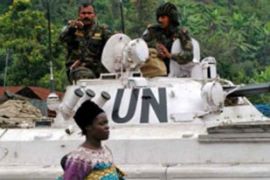UN probes its troops in Congo
The investigation is focusing on an Indian unit accused of trading food for gold.

Published On 14 Jul 2007
“Following these allegations, our procedures kicked in and an investigation by the Office for Internal Oversight Services was launched.”
‘Serious misconduct’
In New York, Ban Ki-moon, the UN secretary general, announced that UN was sending a “management audit team” to Kinshasa “to obtain a full picture of various recent allegations of serious misconduct against UN personnel”.
Despite last year’s historic polls, the vast, mineral-rich central African country still suffers from violence at the hands of armed groups – some from neighbouring countries such as Rwanda – as well as its own army.
The problems are greater in the east of the country, with large areas of North Kivu along the border with Rwanda controlled by the Democratic Forces for the Liberation of Rwanda (FDLR), a Hutu-dominated movement.
Many of the FDLR’s members are said to have taken part in the genocide in Rwanda that killed some 800,000 Tutsis and moderate Hutus in 1994.
Investigations
Earlier this month, an OIOS report on similar allegations against Pakistani peacekeepers in Congo’s northeastern Ituri district found the troops had indeed worked with a local armed group to smuggle gold out of the country.
Meanwhile, another investigation is under way into the the alleged torture and killings of Ituri fighters by a number of Bangladeshi UN soldiers.
Anneke Van Woudenberg, a researcher with New York-based Human Rights Watch, said that while she could not confirm the latest allegations of misconduct, ongoing abuses in Congo were hurting UN efforts worldwide.
“These guys should be held up to the highest standards, if international peacekeeping is to work,” she said.
The UN maintains a 17,000-strong peacekeeping force in Congo.
Punishment of peacekeepers found to have committed crimes while serving with the UN is left at the discretion of their home countries.
Human rights campaigners say national armies have a poor record of disciplining their troops.
Source: News Agencies